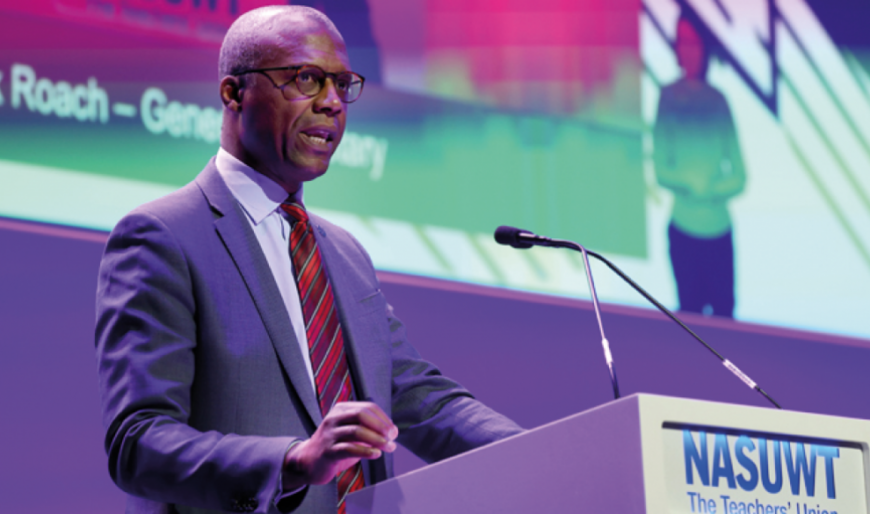Patrick Roach
Patrick Roach became Deputy General Secretary of teachers union, NASUWT in 2010 and served on the General Council of the... Read more »
How to tackle racism in the world of work and make our trade unions more inclusive and more representative at every level

In the last two years, our trade unions have put anti-racism at the centre of our work, and with good reason, as the Conservative government is now returning to its business as usual agenda — scapegoating and attacking refugees and unions and blaming our communities for their disastrous management of the economy, our public services and for the ongoing cost of living crisis.
The age-old Tory tactic of divide and rule is being played out with the government’s legislative programme, including the Illegal Migration Bill and Minimum Service Levels Bill which build on other legislation to extend police powers and remove rights to public protest.
And we know that black communities are bearing the brunt of these measures, just as they bore the brunt of the government’s handling of the Covid pandemic.
While ministers broke the law and partied, black workers were three times more likely to die as a result from Covid-19. And our communities are still paying the price of the pandemic, not least given the continuing failure of ministers to deliver the scale of investment in recovery that our NHS, schools and other public services need, and while they refuse to deliver the fully funded pay rises demanded by our members.
As black workers from across the trade union movement gather this weekend for the TUC black workers’ conference, the need for collective solidarity and organising to tackle the continuing impact of institutional racism in our workplaces and wider society remains urgent.
And our unions are leading the fightback, because we know that tackling racism must also mean defeating the climate of injustice, insecurity and fear which is creating misery for working people and families.
Last autumn, the work of the TUC Anti-Racism Taskforce reached its conclusion with the publication of a manifesto and action plan.
That action plan commits our trade unions to a five-year programme of anti-racist campaigning to tackle racism in the world of work and to help make our trade unions more inclusive and more representative at every level.
The Anti-Racism Manifesto sets out what our unions as a movement will do to make sure we secure economic and social justice for black communities.
Along with the Anti-Racism Action Plan adopted by Congress, it sets out how we will refresh, renew and reboot the movement’s campaigning, organising and bargaining work. And what we need to do to tackle racial inequalities in our workplaces and communities.
These are not simply words on a page — to be forgotten about. This is a concrete set of commitments that will be delivered through the work of a new Anti-Racism Implementation and Oversight Group that is working with unions and with black workers to ensure that the changes and campaigns we have committed to are delivered. And we will be measuring the progress our unions make and reporting on progress annually to TUC Congress.
This is the first time we have established a mechanism to monitor and review progress and take follow-up action. With sustained pressure and commitment from everyone across our union family we can deliver lasting and meaningful change for black workers and black communities across our labour market and within our union movement.
Winning on racial justice at the bargaining table and demonstrating that we are securing more black reps across our movement will be a key action, together with building on the excellent pilot leadership programmes already developed in TUC regions and working to secure a greater pool of experienced black trade union tutors leading our organising activities.
Our new Anti-Racism Network is enabling us to take forward our work with race equality organisations to challenge racist policies that have an impact on black workers and the wider black community and build our campaigning on casualisation, outsourcing, fire and rehire, mass redundancies, the hostile environment and holding the government to account through the Covid public inquiry.
We are also maintaining our commitment to leading by example in relation to how our trade unions recruit, retain and ensure progression of black employees within our unions.
Our unions must be clear that we must demonstrate and be held to account on our record in securing racial justice at work. My own union, the NASUWT, has taken forward its anti-racism action plan in concert with black members and staff as part of our Big Conversation on Racial Justice. This work may be uncomfortable, and it will certainly be challenging, but it is necessary.
Our anti-racism actions are nothing if not about pushing back on the hostile environment that is being pursued ruthlessly by the government to the detriment of black workers and communities and as they pursue their ambitions ahead of the general election. We must stop them.
This article first appeared in the Morning Star. We thank them for the kind permission to reproduce it here.
Patrick Roach became Deputy General Secretary of teachers union, NASUWT in 2010 and served on the General Council of the... Read more »
Why do trade unions and workers look to law?